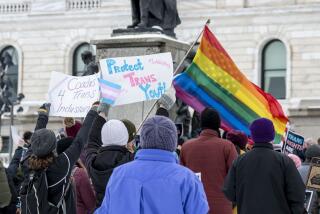High School Confronts Realities of AIDS
- Share via
It happened, finally, the other night at Newport Harbor High. This was a big deal. There had been misgivings about the whole undertaking, worries over approach. Hoag Hospital, which had agreed to participate in the program, pulled out.
As she introduced the program moderator, the PTA president told the overflow crowd that she was delighted a parent “felt comfortable enough with this delicate and sensitive topic” to accept such a responsibility.
From all the fuss, the pussyfooting and the bending over backward not to offend, you would have thought the subject at hand was either obscene or illegal or maybe both. In a different climate, the controversy might have even been grounds for a laugh.
Except you joke about this at your own peril in 1992. Some 200 teen-agers and parents from Newport Harbor High and Ensign Intermediate schools came the other night to hear about teen sex and AIDS.
They should have been hearing about this long ago. Kids everywhere should talk about this in the classroom, during school hours. The good news is lots of kids showed up at Newport Harbor, the bad is that more of them were someplace else.
In two years, reported AIDS cases have grown by 62% among teen-agers and young adults. The infection rate among gay men has gone way down. The gay community’s extraordinary AIDS education efforts are paying off, whereas teen-agers’ notorious delusions of invulnerability are killing them faster now.
Condoms can help; they should be demystified now. That’s not a panacea for an epidemic, but it can slow its spread.
Lynn Posey, from the Coalition for Children, Adolescents, Parents, did a great job of explaining this the other night. She’s got a shtick that kids relate to. She even blew up a condom like a balloon while her hand was inside.
“Now, I don’t suggest that you do this with a man,” she said. You want really safe sex? “Probably the safest thing you can do is do this on your hand and then talk dirty with sign language.”
It didn’t hurt to laugh.
We should talk about AIDS as we do other diseases--What is it? How do you catch it and how do you not?--but instead we get hung up about the sex. Sex can spread AIDS.
The connection is embarrassing and inconvenient. So we shuffle our feet, or we become indignant and self-righteous, or we stick our heads in the sand. We think up weird and dangerous myths about this disease. Some people actually believe AIDS is God’s pay-back for being bad.
Most of the crowd the other night seemed smarter than that. They were overwhelmingly white, wearing nice clothes and easy smiles, a pretty well-scrubbed lot. They live in Newport Beach. Just by turning up here, they showed they have enough sense to know that none of that can shield them from AIDS.
Still, the clash between their reality and the alarming statistics illuminated by an overhead projector--10 million people infected with HIV worldwide, 1 million in the United States, 213,641 U.S. AIDS cases, 2,073 in Orange County alone--was unsettling enough to make it seem unreal.
Here, some teen-age girls tell me, most kids don’t worry about AIDS. They worry about getting pregnant. Lots of them are having sex, even if their parents don’t know.
One of the written questions passed to the panel of presenters: “My boyfriend says that because I’m on the birth control pill, I can’t get AIDS. Is that true?”
No, it is not.
There are no stupid questions. What’s stupid is staying silent, and ignorant, about AIDS. Another written question: “Do vitamins keep the immune system from getting AIDS?”
No, they do not.
Joe was the name of a panel presenter who tested positive for HIV six months ago. He’s 22 and heterosexual and says he screwed up big by having unprotected sex with 20 different women since he was 16 years old.
Of course, it couldn’t happen to him. The cliche finally exploded when Magic Johnson mouthed the same words.
Joe asked the kids in the audience if they’d like him and others who are HIV-positive to come around and talk to them, one on one, or in their classrooms, about AIDS and sex. It looked like every kid in the room raised a hand.
Then Joe asked the parents. Most all of them, too, said that was fine. Except for a few mothers, sitting together, their expressions stern.
“We should do a lot more on abstinence, on how to say no and why to say no,” one mother said. “We are not just talking about genitals. We are talking about emotions and morals.”
Teen-agers in the audience groaned. Some tried to answer back, but they were cut off. They resent the blurring of morality with public health.
“This is exactly what happens all the time!” one boy said, really steamed.
Jean Johnson, who’s son died of AIDS, sensed the emotions surging out of control. “We are having the classic condom-no condom controversy, which has gotten us nowhere!” she said.
Then things settled down. The program worked as planned. Information was shared, questions answered. Kids huddled around Joe after the official stuff was done. Some said they planned to start a petition asking for more sex education in school.
One girl told me she planned on getting tested for HIV herself as soon as she can because she realized, now, that her behavior has been “high risk.” Her girlfriend already had.
Another young couple walking out of the program were relaxed, their arms draped across each other, a bounce in their steps.
“That was pretty cool,” the girl said. “I’m glad we went.”
More to Read
Sign up for Essential California
The most important California stories and recommendations in your inbox every morning.
You may occasionally receive promotional content from the Los Angeles Times.













